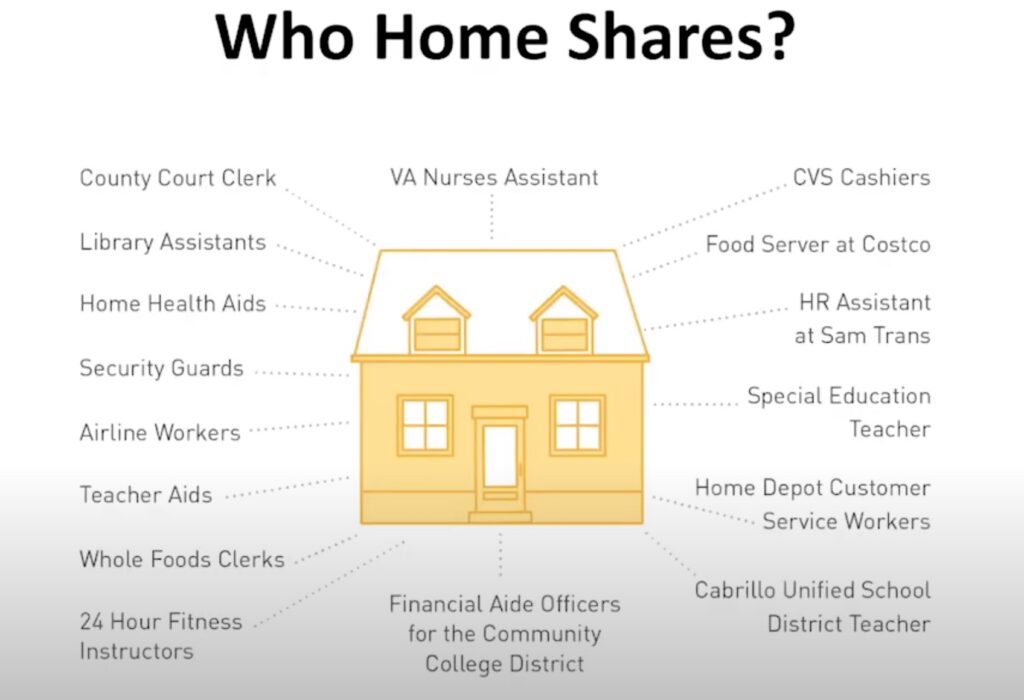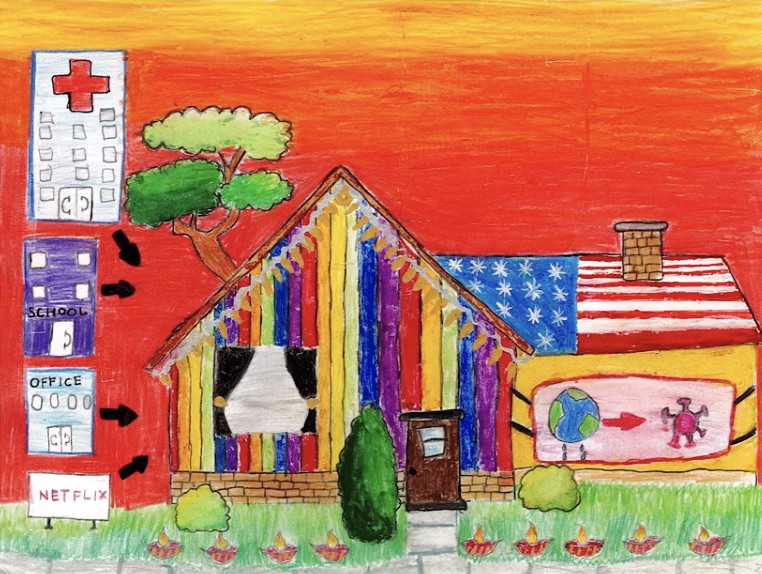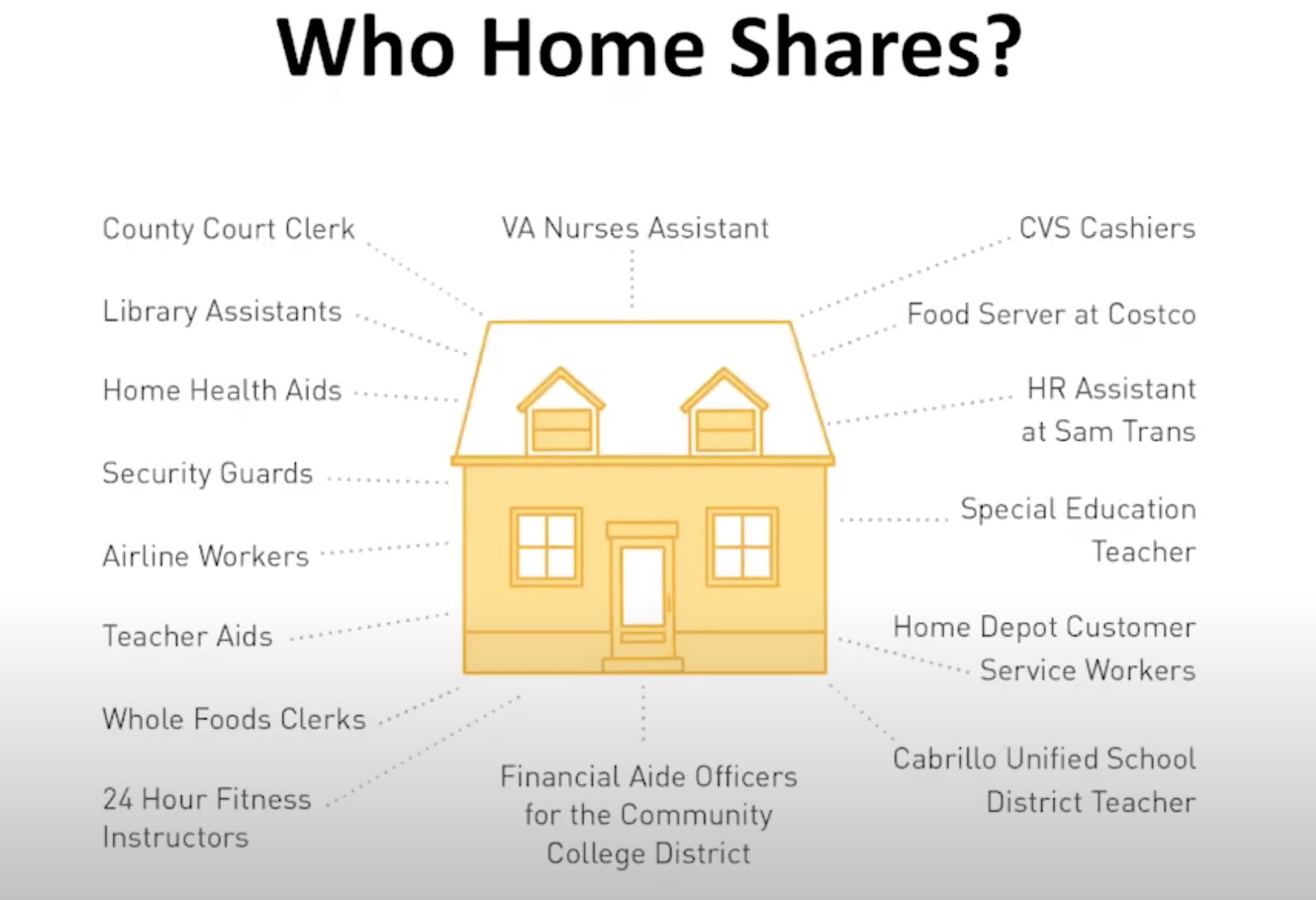|
Getting your Trinity Audio player ready...
|
PRESS RELEASE. For San Mateo County’s HIP Housing for August 2024. “Your Spare Room, Can Change a Life.”
“A furnished bedroom with a private bathroom is available for rent. The 4-bedroom, 4-bath, 2-story home has been fully renovated and is located in the coastal city of Montara. The home has natural light,
redwood tables, a vaulted ceiling with built-in speakers, a laundry facility, and a spacious deck overlooking the ocean. You’ll be within walking distance to public transportation, the beach, and local farms. Nearby, you’ll find grocery stores, restaurants, cafes, and boutiques. Highways 1 and 92 are also close by. We’re seeking a non-smoking, respectful housemate. Rent is $1550 per month, including utilities, with a $1550 security deposit. Ref# 1316.”

What is HIP Housing?
HIP Housing is a San Mateo County based non-profit organization that for over 50 years has been improving the housing and lives of people in our community. The Home Sharing Program is a program funded by the Department of Housing (DOH) that is operated by HIP Housing, a non-profit organization that provides a place to call home to persons in San Mateo County. The Home Sharing Program helps match “providers” with a spare room or rooms with “seekers” who are looking for an affordable place to live. Some of the seekers are also willing to exchange household chores for a reduced rent. Below are some partial monthly listings of the housing opportunities available through this program for both “providers” and “seekers”. Call (650) 348-6660 for more information.
What does HIP stand for?
Human Investment Project. HIP Housing’s mission is to invest in human potential by improving the
housing and lives of people in our community. HIP Housing enables people with special needs, either from income or circumstance, to live independent, self-sufficient lives in decent, safe, low-cost homes. To achieve our mission, we offer four programs listed below. There are no fees associated with enrolling in any of our programs. Visit HIP Housing’s website at www.hiphousing.org
Homesharing – The Home Sharing Program matches people with rooms or accessory dwelling units
(ADUs) for rent (Home Providers) with a Home Seeker who is looking for a reasonable room rental and/or
exchanging extra household chores for reduced rent. All clients are interviewed and screened and
provided a resource guide that includes questions potential housemates should review when they meet
each other. HIP Housing also assists Home Sharers with completing a Living Together Agreement and
provides ongoing follow up support. Call (650) 348-6660 or visit our inquiry form https://hiphousing.org/
programs/home-sharing-program/
Housing Readiness – The Housing Readiness Program (HRP) empowers San Mateo County community
members to navigate our complex local housing landscape. People who contact our agency will be
supported by experienced staff, volunteers and interns to help them become more “housing ready”. This support could include providing housing resources, assistance with completing housing applications, and other activities that help prepare people to enter housing. For more information contact (650) 348-6660.
Self-Sufficiency – The Self Sufficiency Program (SSP) provides housing assistance and support services to low-income parents or transitional aged youth (TAY) who are in school to increase their earning power and become financially self-sufficient within 1-5 years. Participants receive subsidized rent while they complete an education or job training program and find work in their field.
Visit https://hiphousing.org/programs/self-sufficiency-program/ or call (650) 348-666 x 347
Property Development – HIP Housing owns and manages over 500 units of subsidized and below market rate affordable housing in San Mateo County, mostly studio, 1 and 2 bedroom units. Property
development allows HIP Housing to preserve and expand the amount of available affordable rental
housing in the county. Join our Interest list https://hiphousing.org/programs/properties/find-housing/
Interested in volunteering or an internship?
HIP Housing offers a variety of volunteer opportunities including food distribution programs, tutoring,
program outreach, translation, and other marketing activities. Submit a pre-application at
https://hiphousing.org/how-to-help or contact (650) 348-6660 x 303.
More on HIP Housing on Coastside Buzz
FREQUENTLY ASKED QUESTIONS ABOUT THE HOME SHARING PROGRAM
1. How does home sharing work? HIP Housing is a nonprofit organization which since 1972 has been connecting Home owners or renters (Home Providers) who have a residence with one or more bedrooms, with persons seeking housing (Home Seekers) to pay rent or exchange activities for reduced rent. HIP Housing’s Home Sharing program is not a short-term vacation rental type program. Home Providers must live in San Mateo County. Persons seeking housing must either live, work or attend school in San Mateo County or have a housing voucher for San Mateo County. In this housing market, rents in the Home Sharing Program typically range from $750 on up with occasional lower rents. Some rents include utilities and others pay a portion. Reduced Rent Exchanges involve non-medical care such as helping with meals, shopping, cleaning, companionship and doing errands. There are generally more rent exchanges than reduced rent exchanges. Each person has their own space and share common areas. Sometimes clients share a one bedroom unit with one person taking the living room space and the other taking the bedroom. After clients are interviewed by a HIP Housing coordinator, clients are given referrals and contact potential housemates on their own using a guide provided by the agency. HIP Housing’s Home Sharing Coordinators help complete Living Together Agreements between housemates and provide follow-up support.
2. What are the benefits of Home Sharing? Whether a home provider or home seeker, one of the reasons persons decide to home share is because they find it difficult to afford housing costs on their own. For those hoping to find an affordable or low-income housing unit, they may encounter long or closed waiting lists. The reality of getting low-income housing within a short period of time isn’t likely. That’s why home sharing can be a unique housing option. Some clients home share until they are able to find subsidized or low-income housing while others choose home sharing as a way to keep their housing costs affordable on a long-term basis. For home providers, with someone else living in the home they are able to continue living in their own home and neighborhood. Additional benefits of home sharing allow home providers to save money, put the extra income toward other personal or housing expenses, experience a sense of security, enjoy companionship and maintain independence. With market rents unattainable for many, home sharing gives home seekers an affordable room in a home atmosphere. Many home sharers receive mutual benefits of companionship and security, the opportunity to help the home provider and being able to save money, reduce debt and keep housing & utility costs affordable.
3. What type of client applies to the home sharing program? HIP Housing interviews clients of all walks of life including those who are working, seniors, single parents, persons with disabilities, persons exiting from a shelter, students and others who receive benefits such as unemployment, TANF, retirement or disability income.
4. What information do we need from the person applying for home sharing? Applicants are asked to provide proof of ID, names and phone numbers of three persons they would like to use as a reference (preferably employment, residence and personal) and proof of their income. Income information is confidential and used only for statistical purposes. If you are seeking housing, you will be required to provide a current or former landlord or housemate as a reference. Provided the information is available, HIP Housing will conduct a criminal background search through Superior Court databases and a National Sex Offender database check. Information obtained may disqualify someone from the program or may require disclosure on the application and to potential housemates.
5. How long does it take to place someone in home sharing? Clients are encouraged to keep in regular contact with their home sharing coordinator to receive referrals of potential housemates and then to follow-up with the referrals given by returning calls and making appointments to see potential housemates. The number of referrals given to clients of potential housemates depends on a number of factors: family size seeking housing, amount of rent charged/able to pay, location, pets, smoking and other personal preferences. HIP Housing’s staff will work with clients for the duration of the time they are searching for a housemate whether the client finds a placement through our agency or something on their own. HIP Housing cannot guarantee a housemate placement.
6. How long does the typical match last? If both parties are happy with the match & circumstances do not change for either side, matches can last for many years, with great friendships being formed. The average length of stay is nearly three years with some matches lasting a shorter or longer period of time.
7. Do you match people of different ages, interests and genders? Yes. Clients are asked to complete a questionnaire giving them the opportunity to share with us their ideal home share arrangement, personal characteristics and other factors regarding living with another person. Clients have the opportunity to interview and select their own housemate and to check the references of clients.
8. How do you complete a match? The two parties in a home sharing match are offered the opportunity to put their understandings in writing by completing a Living Together Agreement with the assistance of the housing counselor. Each participant is encouraged to review the agreement periodically to make any adjustments or changes. HIP Housing is available to help housemates work through any issues or concerns once the housing arrangement begins. If the match needs to end, each participant is expected to give the other party a written notice as agreed upon in the Living Together Agreement.
9. What can you do to help encourage persons to home share? People may not consider home sharing an option because they believe they can find their own place, find a housemate on their own or may have had a negative experience home sharing on their own. For those seeking housing, finding independent housing may be a longer term goal and clients should take into consideration their ability to pay a first and last month’s rent and deposit, credit and debt situation and paying a rent that may be beyond their means. For Home Providers, they may have had a negative experience sharing with someone in the past. It’s possible they were not provided with the guidance and support needed to help make a successful shared living arrangement (i.e., how to interview a housemate, checking references, completing a Living Together Agreement, follow-up support). HIP Housing provides one-on-one support to clients to help create a positive shared housing arrangement.
10. How do people apply to the Home Sharing Program? Persons can call our staff to discuss home sharing as a possibility for them. Contact HIP Housing at 650-348-6660 for information and to schedule an interview. The interview will last approximately 45 minutes and will involve meeting with one of HIP Housing’s Home Sharing Coordinators to complete an application and interview. HIP Housing has 4 offices throughout San Mateo County and staff bilingual in Spanish.
11. Where are the offices located? The main office is at 800 S. Claremont in San Mateo. The Redwood City office at the Fair Oaks Community Center is open on Tuesdays & Thursdays. The South San Francisco Office at the Magnolia Senior Center is open on Tuesdays. The Daly City Office at the Daly City Community Center is open on Thursdays. Persons can call our main office at 650-348-6660 to schedule an appointment in any of our offices. It doesn’t matter which office the client has their interview in. Each housing coordinator has the same referrals. If a client is home bound, a home visit will be arranged.
CALL HIP HOUSING
(650) 348-6660
800 S. Claremont #210, San Mateo 94402
www.hiphousing.org





